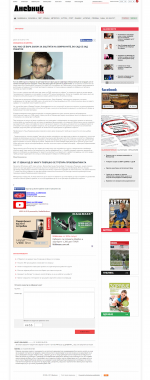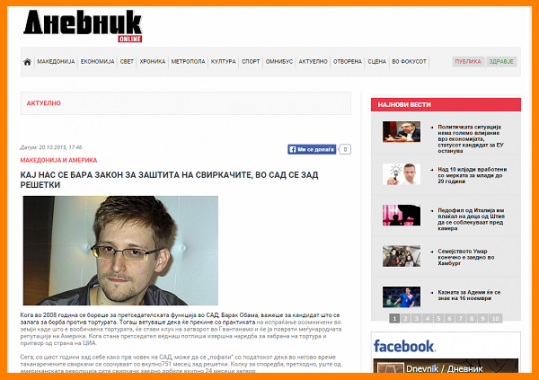Whistleblowers – foreign hypocrisy or a domestic media spin
Published in Reviews
on 28 - 10 - 2015 Author: Vladimir Petreski
Овој напис го има и на: Macedonian
 Link to the original article: Law on protecting whistleblowers is required in Macedonia, despite whistleblowers being imprisoned in the USA
Link to the original article: Law on protecting whistleblowers is required in Macedonia, despite whistleblowers being imprisoned in the USA
Оваа рецензија е изработена во рамките на Проектот на УСАИД за зајакнување на медиумите во Македонија – Компонента Сервис за проверка на факти од медиумите, имплементирана од Метаморфозис. Рецензијата e овозможенa сo поддршка на Американската агенција за меѓународен развој (УСАИД). Содржината на рецензијата е одговорност на авторот и не ги одразува ставовите на Метаморфозис, УСАИД или Владата на САД. За повеќе информации за работата на УСАИД во Македонија, ве молиме посетете ги веб-страницата (http://macedonia.usaid.gov) и Фејсбук-страницата на УСАИД (www.facebook.com/USAIDMacedonia).
[Review: Law on protecting whistleblowers is required in Macedonia, despite whistleblowers being imprisoned in the USA]
The main thesis of this article is that legal protection is requested for whistleblowers in Macedonia (people publicly reporting unlawful act at their workplace), although they are being persecuted in the USA, which is an example of hypocrisy. In addition, the article contains contradictory statements regarding the protection of whistleblowers in the EU countries.
 Link to the original article: Law on protecting whistleblowers is required in Macedonia, despite whistleblowers being imprisoned in the USA
Link to the original article: Law on protecting whistleblowers is required in Macedonia, despite whistleblowers being imprisoned in the USADate and time of publication: October 20, 2015, 17:46
Review date: October 28, 2015
Reviewer: Vladimir Petreski
At the beginning, the article criticizes the state of whistleblower protection in the USA, criticizing President Barack Obama, because the persecution of these people has significantly increased during his presidency.
Now, with six years behind him as the US president, he can “boast” about the fact that during his term, the so-called whistleblowers are facing a total of 751 months behind bars. In comparison, since the American Revolution, up to the beginning of the Obama presidency, all of the whistleblowers were sentenced to a total of 24 months in prison.
The article we are reviewing here, and especially the quoted paragraph, is based on an article of the Fair Observer web site. If we look at things from this perspective, it may really seem as justified and serious criticism. But, let us see the real picture. First of all, the emergence of “whistleblowers” is not something new, but legislative recognition of their role as being positive is actually new. Throughout the past centuries, this practice of revealing sensitive information to the public in order to prevent or expose corruption, some other violation of the laws or to point the finger at the superiors in order to unmask their illegal activities – especially in the area of defense, counterintelligence and internal affairs, was simply never seen before and it was extremely unusual. In the past, such actions were not tolerated and these individuals could expect to be declared traitors or to be found guilty for disrespecting subordination and their superiors. The positive perception of the need for whistleblower protection by law, however, requires the existence of a democratic political system and rule of law.
A period of 751 months equals 62.8 years, out of which 35 years are for the prison sentence of only one person – Bradley Manning, who supplied WikiLeaks with extremely sensitive and classified information. Snowden could be sentenced to a maximum of 30 years, whereas the other 5 persons are either convicted or facing sentences no greater than 2.5 years. The sentences of Manning and Snowden alone are longer than 751 months, so it is not clear how this figure was calculated. However, in the past, a person such as Manning would simply be convicted of high treason, sentenced to death and no months would be added to this seemingly low figure of 24 months – total amount of prison time all the whistleblowers were convicted to before the Obama presidency. Eventually, the whistleblowers epidemic, at least in the US, began to spread with the appearance of Edward Snowden, who exposed the secret NSA materials. All of the three whistleblowers mentioned in Fair Observer’s article acted after the Snowden affair.
Reviewing forward, the following paragraph is also problematic:
And while the US administration is punishing the whistleblowers like never before, international representatives (where the United States play the main role) require the adoption of a law on whistleblowers in Macedonia, which is also mentioned in Priebe’s report.
Priebe’s report includes recommendations, and whether a recommended law will be adopted or not, depends solely on the political will of the Macedonian political stakeholders. The Law on whistleblowers is not mentioned anywhere in the text of the Przhino Agreement, and we recently found out that the Macedonian political parties agreed to pass such a law as a counterbalance to the law, which would restrict the publication of the “bombs”. Also, it is clear that this is one of SDSM’s requests, for such a law to be applied to the individuals currently in custody, so that they would receive whistleblower status as per the public request of the leader of SDSM. Therefore, the allegation that “international representatives (where the United States play the main role) require the adoption of a Law on whistleblowers in Macedonia” is highly problematic. We can be sure that if SDSM and VMRO-DPMNE had no interest to adopt such a law, they wouldn’t be pressured to do so by the foreign factor. At least not now during the current political crisis when the future of the overall democratic process is brought into question.
Furthermore, there is a significant discrepancy between different parts of the article. In the body text of the main article it is stated that there is a law on “whistleblowers” in “most of the countries of the EU”, but the small add-on article, which is connected to the main one, serves to provide an additional explanation/context of the main article, contains another statement of professor Karakamiseva-Jovanovska and saying something completely different:
Out of a total of 28 EU members, only four – the United Kingdom, Luxembourg, Slovenia and Romania – have adopted a law which offers direct and full protection for the whistleblowers. In seven of them (Bulgaria, Finland, Greece, Lithuania, Portugal, Slovakia and Spain) the provisions for their protection are very limited, and in the remaining 17 countries their protection is treated superficially or there aren’t any legal solutions for this issue…
According to this statement, it turns out that in most of the EU countries the protection of whistleblowers is at a very low level or doesn’t exist at all. Contradictory allegations look very bad. That is the easiest way to lose the cred ibility of the readers and they eventually remain uninformed since they have no way of finding out which of the two conflicting information is accurate. In this particular case, none seems to be completely accurate, and it looks as if the truth is actually somewhere in the middle.
In the executive summary of this Transparency International report on the legal protection of whistleblowers, it is said that four EU countries have separate laws, or a separate legal framework, but of the other 23 EU countries, 16 countries have partial legal protection for employees who would decide to report illegal activities, whereas only 7 countries have a limited or no legal framework whatsoever. The last progress report on this legislation at the European level, released by the Council of Europe in April this year, indicates positive developments in a number of countries: the Czech Republic and Ireland (a new law in 2014), France (new laws from 2007 to 2014), Slovakia (a new law in January 2015) and Serbia (a new law that came into force in June this year).
In the executive summary of this Transparency International report on the legal protection of whistleblowers, it is said that four EU countries have separate laws, or a separate legal framework, but of the other 23 EU countries, 16 countries have partial legal protection for employees who would decide to report illegal activities, whereas only 7 countries have a limited or no legal framework whatsoever. The last progress report on this legislation at the European level, released by the Council of Europe in April this year, indicates positive developments in a number of countries: the Czech Republic and Ireland (a new law in 2014), France (new laws from 2007 to 2014), Slovakia (a new law in January 2015) and Serbia (a new law that came into force in June this year).
At the end, we would briefly comment on the title of the reviewed article: “Law on protecting whistleblowers is required in Macedonia, despite whistleblowers being imprisoned in the USA“. The problem with this title is the fact that three persons, who could be categorized as whistleblowers in the upcoming legal proceedings, are being imprisoned in Macedonia, too.
Оваа рецензија е изработена во рамките на Проектот на УСАИД за зајакнување на медиумите во Македонија – Компонента Сервис за проверка на факти од медиумите, имплементирана од Метаморфозис. Рецензијата e овозможенa сo поддршка на Американската агенција за меѓународен развој (УСАИД). Содржината на рецензијата е одговорност на авторот и не ги одразува ставовите на Метаморфозис, УСАИД или Владата на САД. За повеќе информации за работата на УСАИД во Македонија, ве молиме посетете ги веб-страницата (http://macedonia.usaid.gov) и Фејсбук-страницата на УСАИД (www.facebook.com/USAIDMacedonia).
INFOGRAPHIC
 TRUTHFULNESS
TRUTHFULNESS
has facts
partially
partially
 SOURCES OF INFORMATION
SOURCES OF INFORMATION
sources are presented
official, unofficial
relevant
more sources
mostly one-sided
 EXTENSIVENESS
EXTENSIVENESS
extensive
information may have been concealed
 BIAS
BIAS
partially presenting the truth
spinning the truth
has false information
cannot be determined
political bias
 COMMENTING
COMMENTING
comments included
integrated with the facts
 PLAGIARISM
PLAGIARISM
original work
author is attributed
 TITLE QUALITY
TITLE QUALITY
misinforms
creative
sensationalistic
tendentious
 PHOTOGRAPH
PHOTOGRAPH
has a photograph
appropriate
neither manipulating nor informing - serves as an illustration
author (source) is not attributed
 HATE SPEECH
HATE SPEECH
no offensive speech
no hate speech
doesn't encourage violence
no discrimination
 EDITED FOR THE WEB
EDITED FOR THE WEB
medium readability
low quality multimedia elements
has no contextual links
somewhat orderly
not connected with tags


